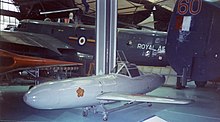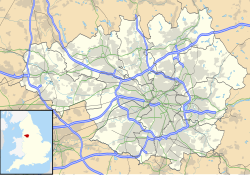Science and Industry Museum
 Entrance structure reflecting its science/industrial themes | |
| Established | 15 September 1983 |
|---|---|
| Location | Liverpool Road, Manchester, England |
| Coordinates | 53°28′37″N 2°15′20″W / 53.47694°N 2.25556°W |
| Type | Science museum |
| Visitors | 556,523 (2019)[1] |
| Public transit access | Metroshuttle |
| Website | scienceandindustrymuseum.org.uk |
| Science Museum Group | |



The Science and Industry Museum in Manchester, England, traces the development of science, technology and industry with emphasis on the city's achievements in these fields. The museum is part of the Science Museum Group, a non-departmental public body of the Department for Digital, Culture, Media and Sport, having merged with the National Science Museum in 2012.[2]
There are extensive displays on the theme of transport (cars, railway locomotives and rolling stock), power (water, electricity, steam and gas engines), Manchester's sewerage and sanitation, textiles, communications and computing.
The museum is an Anchor Point of the European Route of Industrial Heritage and is on the site of the world's first passenger railway station – Manchester Liverpool Road – which opened as part of the Liverpool & Manchester Railway in 1830. The railway station frontage and 1830 warehouse are both Grade I listed.
History
[edit]The museum was called the North Western Museum of Science and Industry when it opened in 1969 in temporary premises on Grosvenor Street in Chorlton-on-Medlock. It had close ties with the University of Manchester Institute of Science & Technology, having mostly grown out of the Department of History of Science & Technology, and UMIST's Richard L. Hills was the museum's first lecturer in charge.
In 1978, Greater Manchester Council purchased the earliest part of the former Liverpool Road station from British Rail, which had been closed in 1975. The council paid the nominal sum of £1 for the site. The museum opened at this site on 15 September 1983 and later expanded to include the whole of the former station.[3]
Since 2007 the museum has organised an annual science festival in Manchester.
In 2014, it was announced Sally MacDonald would become the director. MacDonald left her role as head of collections at University College London and succeeded Jean Franczyk as director.[4]
In July 2021, the permanent closure of the Air and Space Hall was announced. A spokeswoman has also said that the objects displayed would be returned to their original owners, and the objects owned by the museum would be displayed in future exhibits.[5][6] The collection was dispersed over the winter of 2021–22.[7]
Exhibitions
[edit]Exhibits at the Science and Industry Museum include:
Computing and communications
[edit]- A replica of the Manchester Baby
- A Connected Earth gallery that tells the history of communications in Manchester and the North West of England opened in October 2007.
Locomotives
[edit]
- Ericsson's Novelty – A replica incorporating parts from the original locomotive of 1829
- British Rail Class 77 No. 27001, liveried as Nederlandse Spoorwegen (Dutch Railways) No. 1505, Ariadne – A 1.5 kV DC electric locomotive built by Metropolitan-Vickers in 1953
- South African Railways GL class Garratt No. 2352 – Built in 1929 by Beyer, Peacock & Company, Manchester
- Pakistan Railways 4–4–0 No. 3157 (broad gauge) Originally built for North Western Railway of India by Vulcan Foundry, Newton-le-Willows (around 1911–1914).
Former galleries
[edit]Previous permanent exhibition galleries which have now been decommissioned include:
- Electricity Gallery - generation, distribution and use of electricity
- Gas Gallery - past to present look at the gas industry
- Underground Manchester - sanitation and water supply
- A space-themed gallery, with exhibits encompassing historical space flight, space science and also science-fiction, formerly took up the majority of the upper balcony of the Air and Space hall. This was eventually considered outdated and removed in its entirety.
Some past exhibitions
[edit]- Body Worlds 4 between 22 February and 29 June 2008[8]
- LMR 57 Lion Britain's oldest steamable locomotive (in the Museum of Liverpool since 2007)
- Stephenson's Rocket – from 25 September 2018 to 8 September 2019[9]
Railway
[edit]
Until 2018, demonstration passenger trains ran within the museum grounds on selected dates. Trains were hauled by the museum's two operational steam locomotives:
- Planet – A replica of Robert Stephenson & Company's Planet class locomotive, built by the Friends of the Museum of Science and Industry in 1992. The original locomotive was constructed in 1830 and hauled trains on the Liverpool and Manchester Railway.
- Agecroft No. 1 – An 0–4–0 saddle tank built by Robert Stephenson & Hawthorns in 1948 for use at Agecroft Power Station. Restored to working order in 2011.
The museum's railway line was connected to the national rail network near Ordsall Lane Junction. However, construction by Network Rail of the Ordsall Chord railway link, which was completed in 2017, severed this connection and significantly shortened the museum's running line despite a legal battle to save it.
As of 2019, railway operations at the museum were suspended indefinitely. In June 2024, the museum confirmed that the railway would not resume operations, citing both the shortened line and concerns over loadbearing issues on the historic structures on the site. The tracks will be incorporated into a redevelopment of the site that will improve accessibility to the area.[10]
Industrial machines
[edit]

The museum exhibits the large collection of stationary steam engines, hot air engines, diesel engines, hydraulic pumps, large electric generators and other similar machines. Most of these machines are operational and occasionally can be seen running. This exhibit includes the last stationary steam engine built to power a mill.
There is also the exhibit of spinning and weaving machines, covering all the steps from wool to textile. These machines are run for a few minutes at scheduled times.
Adjacent St John's Quarter
[edit]The museum is adjacent to a £1 billion redevelopment area on the former site of Granada Studios. Work on the area, which will be known as St John's Quarter, is expected to be completed by 2022.[11] The Manchester International Festival's new Factory venue opened alongside the MSI in 2023 as part of the redevelopment.[12][13]
The MSI have been granted planning permission to build a new Special Exhibition Gallery on the ground floor of the New Warehouse. Architectural firm Carmody Groarke won a competition to design the new gallery which is set to be complete by October 2020.[14]
In July 2016 the council stated that, along with development partner Allied London, they had been in talks with the MSI "exploring how the presence of Factory opens up new possibilities for revitalising the whole area below Deansgate as a creative hub, with a joined up and extensive public realm. MSI's own developments plans are being aligned with this creative vision and the museum itself will become part of the creative public realm, with MSI's creative science offer balancing the creative and cultural production of Factory."[12]
See also
[edit]- Museum of Transport, Greater Manchester
- List of museums in Greater Manchester
- List of transport museums
- List of aerospace museums
References
[edit]- ^ "ALVA - Association of Leading Visitor Attractions". alva.org.uk. Retrieved 23 October 2020.
- ^ "Manchester's MOSI and London's Science Museum to merge". BBC News. 2 December 2011. Retrieved 19 September 2012.
- ^ "History of the Museum — MOSI". Museum of Science and Industry. Archived from the original on 31 October 2007. Retrieved 14 March 2009.
- ^ Yakub, Qureshi (May 2014). "Respected curator named as new boss of Museum of Science and Industry". Manchester Evening News. Retrieved 1 May 2014.
- ^ "Air and Space Hall". Twitter. Archived from the original on 14 July 2021. Retrieved 14 July 2021.
- ^ "Science and Industry Museum to leave Grade II-listed Manchester hall". BBC News. 14 July 2021. Retrieved 14 July 2021.
- ^ "Ex-Manchester airframes spread far and wide". Aeroplane. 50/3 (587). Key Publishing: 10–11. March 2022.
- ^ MOSI. "BODY WORLDS 4: The Original Exhibition of Real Human Bodies". Archived from the original on 17 January 2008. Retrieved 14 June 2009.
- ^ "Stephenson's Rocket returns". Science and Industry Museum. Retrieved 8 April 2019.
- ^ "Lower and Upper Yard". Science and Industry Museum. Retrieved 24 June 2024.
- ^ ITV report (27 October 2014). "£1bn vision for former ITV site revealed". Granada Reports. Manchester. Retrieved 23 July 2016.
- ^ a b Manchester City Council (July 2016). Executive meeting: 16. Updated Draft St Johns Strategic regeneration framework and Factory Manchester (Report). Manchester City Council. p. 11. Retrieved 23 July 2016. Pdf.
- ^ Brown, Mark (20 June 2023). "Manchester arts venue Factory International renamed after Aviva". The Guardian. Retrieved 16 February 2024.
- ^ "Science and Industry Museum Special Exhibition Gallery update". Science and Industry Museum. 20 May 2019. Retrieved 2 October 2019.
Further reading
[edit]- Hills, Richard L. (2018). The Seven Ages of One Man: or, how one man started the Museum of Science and Industry in Manchester. Gloucester: Choir Press. ISBN 9781911589679.
External links
[edit]- Official Website
- Aeroflight List of Aero collection
- Entry in 24 Hour Museum
Lua error in Module:Navbox at line 192: attempt to concatenate field 'argHash' (a nil value).
Lua error in Module:Navbox at line 192: attempt to concatenate field 'argHash' (a nil value).
- Museums in Manchester
- European Route of Industrial Heritage Anchor Points
- Museums sponsored by the Department for Culture, Media and Sport
- History museums in Greater Manchester
- Science museums in England
- Technology museums in the United Kingdom
- Industry museums in England
- Transport museums in England
- 1983 establishments in England
- Science Museum Group
- Museums established in 1983






